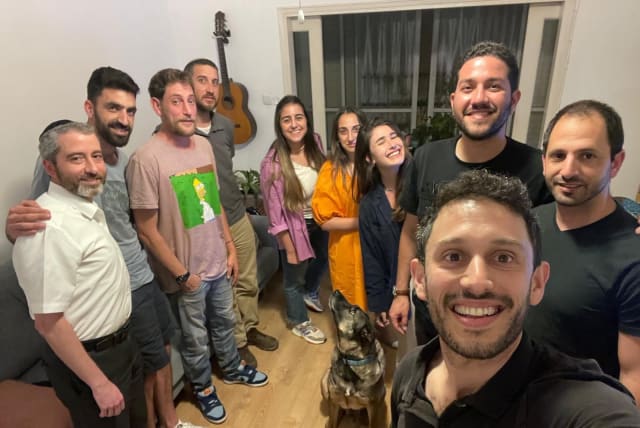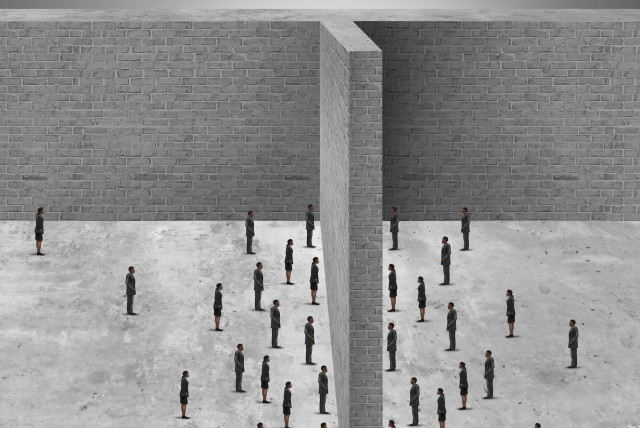Online initiative gets Israelis and Diaspora Jews talking

Ledaber's mission is to heal Israeli society through personal interactions and foster genuine understanding.
In the midst of a deeply polarized Israeli society, a ray of hope shines through the Ledaber initiative. Founded by Omer Bialer, a 33-year-old social activist from Tel Aviv, Ledaber (“to talk” in Hebrew) seeks to address the crisis of trust among Israelis from different ideological camps. The project aims to create a platform for open and meaningful conversations, allowing participants to understand and empathize with each other’s perspectives.
The process works by creating a platform that enables face-to-face video calls between Israelis from different backgrounds. Participants sign up through the project’s website, and the team carefully matches them based on their beliefs and opinions. These matched individuals engage in conversations. The goal is not to win arguments but to build trust and bridge the gap.
The genesis of Ledaber
Ledaber came about just two days after the dismissal and reappointment of Defense Minister Yoav Gallant back in March. Bialer told The Jerusalem Post that he recognized that significant events like this could “sway public opinion temporarily. Most people tend to interact solely within their own echo chambers, leading to a lack of effective communication across ideological divides.”
The root cause of this growing disconnection, according to Bialer, is a crisis of trust, when Israelis start to doubt whether those on the “other side” genuinely have their best interests at heart. “The prevailing sense of enmity was exacerbated, in part, by the prevailing sentiments of hatred,” he said.
Bialer contended that the cycle of hatred was not being addressed by the current Israeli leadership, and he felt a deep sense of responsibility to intervene and foster positive change. He firmly believes that a respectful discourse between people from opposing backgrounds could be a stepping stone toward renewing mutual trust.
The healing power of face-to-face conversations
Ledaber was envisioned as a civil enterprise, detached from political affiliations, where ordinary citizens could demonstrate what respectful dialogue between differing viewpoints could be.
“There will be no shortcuts,” he said. “The only way to get people out of their minds is to show them personally that the other side is not their enemy. We want to make this step accessible to every Israeli and succeed in reaching every home in Israel.”
He added that “the project is not intended to lower the flames in Israel. The flames are high for justified reasons – we are in the middle of the social event of shaping the character of the country for years to come. This way, in the end, the project shows that hatred is not required to solve the crisis, and should be removed from the public discourse. Every possible future of Israeli society will be better if Israeli citizens get to know each other and want the best for each other – and the way to get there, in my opinion, is through personal acquaintance.”
The impact of Ledaber conversations
As Ledaber’s impact began to take hold, testimonies from participants started pouring in. David , for example, supports the reform, while Alon opposes it. Their conversation, lasting over two hours, allowed them to understand each other’s fears, hopes, and aspirations. Through this encounter, they discovered shared values, even though they disagreed on some points.
Alon shared: “I understood from you [David] that you fear the day when there will be a demographic majority of the ultra-Orthodox, and it will affect the private lives of secular people and exacerbate the issue of equality in the burden. I understand that you fear the government’s absolute power to enact laws without proper judicial oversight, and you fear a judicial reform that will cause that.”
David responded that “regarding the judiciary, I agree with him, but I think we won’t agree on the practical implementation of it. In other words, I don’t see Bibi, [Justice Minister Yariv] Levin, or [Constitution, Law and Justice Committee chairman Simcha] Rothman as people who are not honest, moral, and have a good understanding of the law.”
Alon added that “a point that occurred to me during the conversation is that if more secular and opposing people, instead of encountering religious and Jews through television channels, meet them face to face with Haredim and religious people together, they will find that Judaism is much less scary than they think, not wanting to harm anyone, quite the opposite. And even if they don’t agree on everything, I’m sure they will fear less and feel less threatened.”
Jerusalem Post Store
`; document.getElementById("linkPremium").innerHTML = cont; var divWithLink = document.getElementById("premium-link"); if (divWithLink !== null && divWithLink !== 'undefined') { divWithLink.style.border = "solid 1px #cb0f3e"; divWithLink.style.textAlign = "center"; divWithLink.style.marginBottom = "15px"; divWithLink.style.marginTop = "15px"; divWithLink.style.width = "100%"; divWithLink.style.backgroundColor = "#122952"; divWithLink.style.color = "#ffffff"; divWithLink.style.lineHeight = "1.5"; } } (function (v, i) { });

